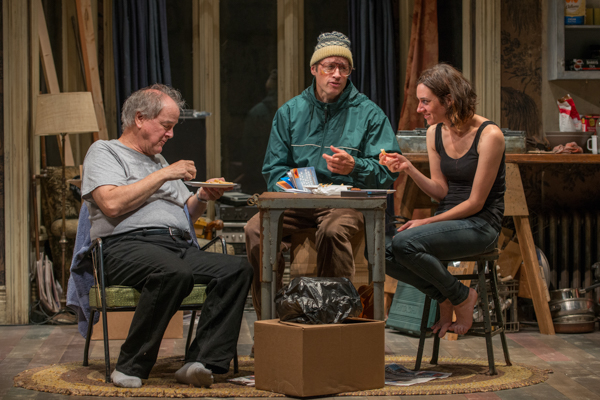The Night Alive
Life and death, violence and happiness coexist in Steppenwolf’s luminous staging.

(© Michael Brosilow)
Thoughts of mortality haunt all of us, but they are particularly potent in the world of playwright Conor McPherson. With The Night Alive, now playing at Chicago's Steppenwolf Theatre, the specter of death is palpable, flickering like a ghost on the outermost edge of your peripheral vision. Like so many of McPherson's simultaneously, paradoxically twilit and luminous works, shadows are ever encroaching in The Night Alive, closing in on a marginal world many times removed from the sturdy, sunny, productive center of well-adjusted society.
The people who fill the dismayingly filthy flat where the 90-minute drama unfolds embody mundane desperation. Small-time grifters, halfhearted prostitutes, chronic melancholics, and sloppy alcoholics, the characters here aren't even notable enough to be tragic. Nobody has an intact family or a steady job. Nothing is clean. Everyone is living on the cusp of hopelessness.
The Night Alive illuminates an emotionally powerful battle between good and evil, and life and death. McPherson does so by homing in on the lives of people who are invariably overlooked, and who — at least on the surface — seem to the world at large to be little more than space holders. It's unlikely that anyone in The Night Alive will ever do anything that will bring them any degree of respect. Tommy (Francis Guinan), Doc (Tim Hopper), Maurice (M. Emmet Walsh), and Aimee (Helen Sadler) are the invisible people you pass a hundred times a day in any given city. McPherson doesn't turn them into heroes. He does them one better, turning what's nondescript into something vivid and surging with vitality.
Tommy is at the heart of this ragtag group. He's a shambling, acrimoniously divorced man who is barely managing to avoid plunging into full-on squalor. Designed by Todd Rosenthal, Tommy's apartment is fetid, with garbage, dirty laundry, and a sink so crusty-looking you'd swear you could actually smell the place. Tommy's life takes a fortunate turn one night while he's at the local convenience store picking up chips for dinner. He comes stumbling home with Aimee, a thin, probably malnourished young woman who is bleeding profusely after being smacked by a man who could have been her boyfriend or her pimp or a perfect stranger — it's impossible to know.
Doc, a mentally damaged yet also eerily intelligent man who works with Tommy, makes up the third member of this fractured, ad-hoc family. Broken and disconnected, this threesome creates a home and a safety zone where they're able to dance and sing (clumsily and off-key). The ramshackle limbo that is Tommy's home becomes filled with a sense of warmth and humanity that not even moldering garbage and hunger pangs can diminish. As the trio talks, argues, and haltingly uncovers the goodness each member harbors within, McPherson's quietly effective script transforms the sordid into the sublime.
Happiness, or what passes for it, is short-lived. With the arrival of Kenneth (Dan Waller), the fragile refuge is ripped apart in a scene threaded through with tension as terrifying as a piano wire being tightened around the jugular. Kenneth's precise identity is a mystery, but there's no questioning the aura of evil that hisses around him. His presence fills the stage with dread, and before he's gone, Tommy's world is permanently rent by terror. (It's perhaps worth noting that McPherson has a gift for inserting the Devil himself into the lives of his characters.)
The drama's tantalizingly ambiguous ending echoes the famous final moment of McPherson's Shining City, complete with evocations of ghosts and the possibility that it's been death and not life we've been dealing with all along.
Director Henry Wishcamper draws magnificent, unshowy performances from his cast. Guinan anchors the ensemble as both a heroic Everyman and a ragged unfortunate street person. Waller is pure horror show, a venomous creature that sets your teeth on edge and makes your hair stand on end. As Doc, Hopper is heartbreaking in his mental deficiencies — until his stammering uncertainty shows him to be a spookily astute philosopher whose every word seems prophetic. Sadler gives Aimee a toughness born of brutality and the vulnerability of a young woman who is bone-tired of dodging body blows. And as the widow Maurice, Walsh creates a character both comically cranky and wrenchingly heartbroken.
The final seconds of The Night Alive are bound to frustrate some. But they're also strangely perfect, a luminous loose end amid lives in tatters.









